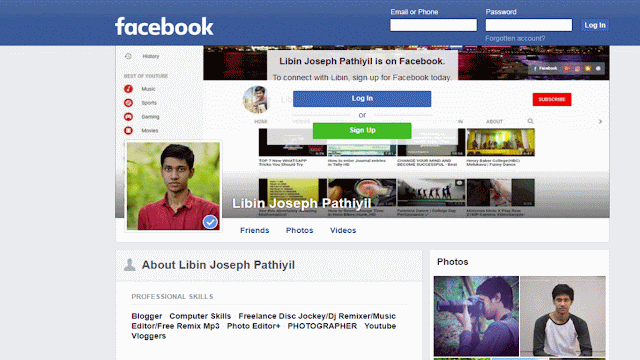Protect your Social media account/Bank account from Hackers
1) Create a strong password
Avoid including your name, birth date, pets, or common words in your
password: make it difficult to guess.
A strong password will be at least 8 characters in
length, but the more the better. The longer (more characters) your password is,
the more time it will take the hacker to crack it.
A strong password should contain at least one of each of
the following characters lower-case letters, upper-case letters, numbers, and
special characters.
Eg: li654B87iNj1O58Se97Ph
2) Change your passwords regularly
If you’ve got a password manager set up then this might be taken
care of for you but whatever your situation you should be changing your
passwords on a regular basis, and we do mean all of them.
3) Avoid using the “remember password” feature on web browsers.
This is particularly important if you are not using your own computer. When
the “remember password” prompt comes up and you are not at your own computer,
click on the “not now” button.
If you have set a master password for your browser, you
can use the “remember password” function, as having a master password will
prompt anyone trying to see your passwords to enter another password just to
show the passwords.Whether your browser automatically saves your passwords
in a master password-protected file will depend on your operating system and
your browser. You can ensure that a master password is in effect by checking the
your browser preferences.
4) Add two-factor verification
We’ve been banging the two-factor verification drum for a while now,and you can set it up on
most online accounts, including ones for Apple,Google and Microsoft. It means even if someone gets a
hold of your username and password, they won’t be able to log into your account
on a new device without an extra code delivered over SMS or through an app.
Which means they’ll need physical access to your devices.
5) Watch what you share online
Your accounts are only as secure as the weakest links protecting
them—and those links often involve someone impersonating you. Make sure
personal details that can be used to verify your identity, like your home
address, your birthday, or even what soccer team you support (is that your
“secret security question”?) aren’t all over your social media profiles.
6) Only type your password into trusted computers.
If you are using a computer that you don’t know or trust, avoid doing
anything that requires you to enter your password. Hackers commonly use
keystroke loggers on computer systems that record everything you type,
including passwords. If it’s not possible for you to avoid typing a password
into a computer you don’t trust, change your password as soon as you can once
you’re back at your own computer.
7) Set up Login Alerts.
Login Alerts send you an alert
when someone logs into your account from a new device or browser. You can
choose to get login alerts via email or text messages.
8)
Secure your connection
When logging into a sensitive account, the best place to do it is
at home. I'm assuming here that you've followed my other security tips
about securing your network and making sure your computer doesn't have a data stealing virus. If you have to use
Wi-Fi, add extra security with a Virtual Private Network. This creates a
secure, encrypted link with a third-party server and you access your sites
through that link.It's an extra level of protection that hackers shouldn't be
able to crack. On a laptop,CuberGhost is
a good option. For a tablet or smartphone, check out Hotspot Shield VPN or avast! SecureLine VPN.Know that VPNs do slow down your Internet speed. Turn
them off for streaming videos or general browsing.
9) Check your account activity
Many of your online accounts let you check up on recent
activity—you can head to this page for Facebook and this page for Google, for example—and
it’s worth doing this regularly to make sure nothing seems amiss. You can
typically log out of all sessions but the current one, and revoke account
authorizations for any devices you don’t recognize.
10) Delete third-party account connections
There’s nothing inherently wrong with letting other apps and
services connect to your Facebook and Twitter, but you should keep these
connections to a minimum and remove any you’re not using, to block off any
potential avenues for hackers to use. You can easily manage your connected apps
online for your Google,Twitter and Facebook accounts
11) Keep your software updated
Many a vulnerability comes through outdated software, so you should always
make sure your operating systems and browsers are right up to date to keep your
computer secure and by extension the online accounts you access through them.
Thankfully, most software packages now auto-update seamlessly enough, so it’s
not difficult to stay up to date.
12) Use a secret email address
If someone knows your email address,
they’re halfway to knowing how to log into your accounts—and these days it’s
not that difficult to find out someone’s email address. Setting up a private
email address (that doesn’t really relate to your name) solely for logging into
your social media accounts is another way of keeping them more secure
13) Trust no one
You’ll hear this mantra a lot if
you watch X-Files, and it’s one you should repeat to yourself
whenever you receive an email or social media message with dubious contents.
Beware of following links without any context and be aware that phishing scams
continue to get smarter and trickier to spot. Think before you click and
read up on the latest threats.
14) Close the
accounts you’re not using
Here’s what happens
to your old, unused accounts on the web:They get hacked. And sometimes they lead the way to the more valuable
accounts that you really do care about, so it makes sense to keep the number of
accounts you’re using down to a minimum. As an added bonus it means you’ve got
fewer usernames and passwords to worry about.
1)Checking your account
balance
One easy step to ensure
a secure bank account is to constantly checking your account
balance and reviewing your monthly statement. If you note unusual activity, you
can immediately, take further measures.
2) prevent account
misuse.
If you make any bank
transactions through the internet, make sure that you internet is safe and
protected. You might have to enter your account details in many cases. So make
sure your network is bug free to prevent account misuse.
3) secure your personal
details
Also when you open or reply
to any links that might seem to be an official one from the bank proper
observations must be carried out to ensure that you are at the right site and
not replying to a trap. It is very important to secure your personal
details as well.
4) Secure your email
The usage of your
official and personal mail addresses should be very carefully done. It is easy
to hack a mail account after obtaining all the personal information and using
your mail account a hacker can easily reset your bank account’s password.
Ensure that you do not open your mail at unsafe or unfamiliar places. If so,
make sure that you have properly signed out. 5) Avoid using public networks.
Use applications that are
available in plenty in the financial sector especially, which are provided by
the banks to do every bank transactions in your mobile phones and avoid using
public networks.
6) Secure Debit and Credit
card
Make sure that you credit
or debit cards are safe and if stolen then alert the authorities and
take every precautions. Special care must be taken to block your account once
you suspect your card or your card number is stolen.In this case
immediately block your credit /debit cards.
7) Use official
and authorized websites
Ensure that for all
transactions, you use official and authorized websites so that no malwares or
viruses get into your system that might affect the security measures in the
future.
8) Beware of all the
personal information that you share over the internet.
9) If you write PIN number
into your cell phones,ensure that it is safe
10) In case of security
questions required to ensure authorized access, make sure that the questions
that we select are the ones that cannot be easily answered and only the ones
that you know.
11) Never Share your personal account details over fake
calls pretending to be bank or fake emails asking for details in the form of
lottery winning.
12) Never ever post
pictures which contain your account details and personal information on any
social medias.















